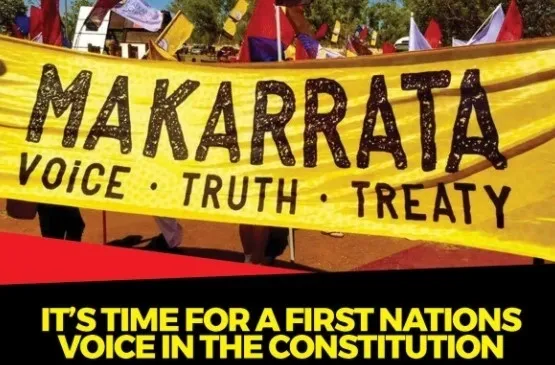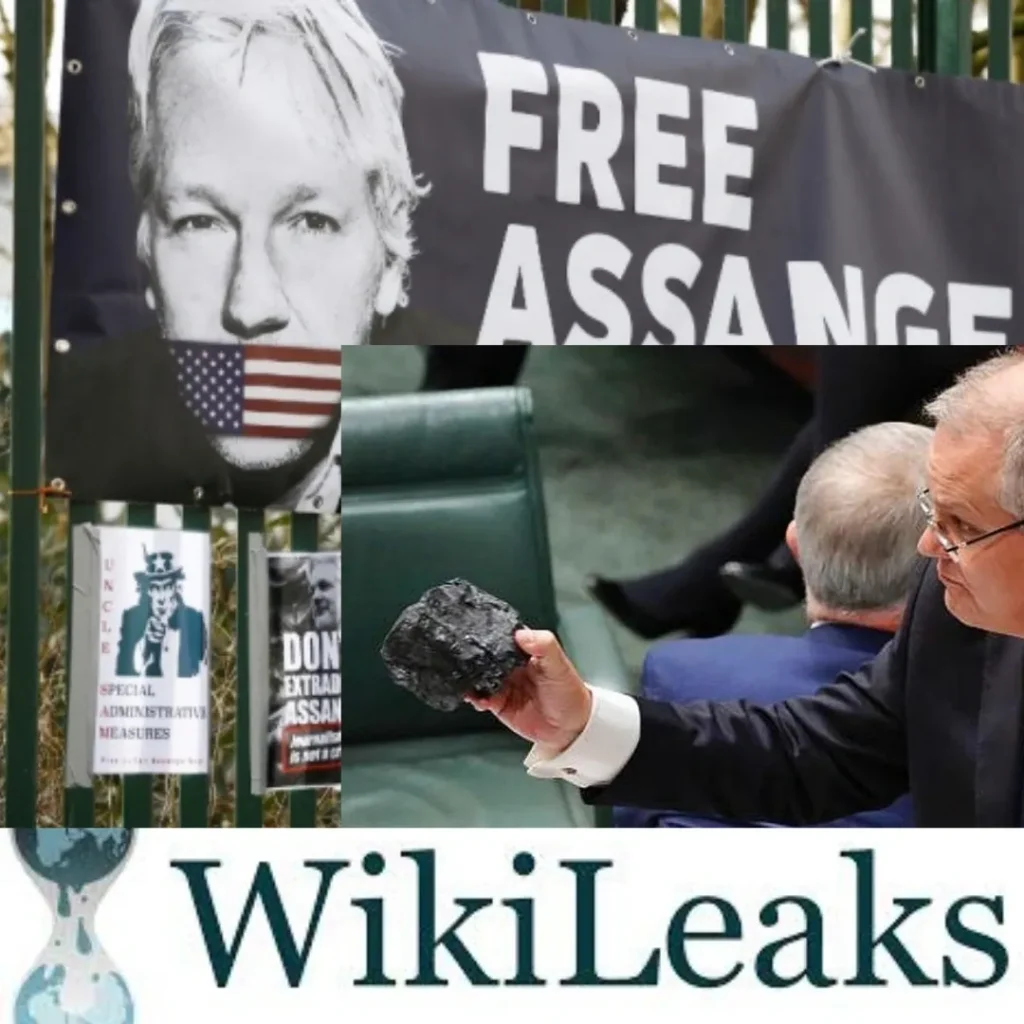
Changing one word in the Australian national anthem will not deliver Truth, Voice or Treaty.
By Jackie Pearson
The Uluru Statement from the Heart will be four years old this May. It invited all Australians to walk with First Nations people for a better future but the Morrison Government has walked away from it.
The bipartisan back slapping over changing one word in the national anthem – from “young” to “one” – shows how little progress we’ve made to tell the truth about this country’s deeply racist beginnings.
Until we are prepared to tell that truth how can we right the wrongs, walk together as one, toward the better future desired and so beautifully articulated by the authors of the Uluru Statement from the Heart?
The Statement
If you’ve never read the Uluru Statement from the Heart, it can be found here. The truth it speaks is undeniable: “Our Aboriginal and Torres Strait Islander tribes were the first sovereign Nations of the Australian continent and its adjacent islands and possessed it under our own laws and customs.”
The authors of the Statement go on to describe this 60,000+ year sovereignty as a “spiritual notion” – the ancestral link between mother nature, that is, the land, and the Aboriginal and Torres Strait Islander peoples is the basis of their sovereignty. It was never ceded or extinguished. It was stolen. Atrocities were committed and remain covered up.
One of the most important lines in the Uluru Statement says: “With substantive constitutional change and structural reform, we believe this ancient sovereignty can shine through as a fuller expression of Australia’s nationhood.”
Truth telling must be the starting point. A wound has been allowed to fester for almost 250 years. Inter-generational trauma is the outcome. The symptoms include ongoing incarceration and black deaths in custody, shameful rates of youth detention, economic disadvantage, poor education and health outcomes and ongoing racial discrimination.
This just does not add up to “for we are one and free”. It is much more like the continuation of the “torment of powerlessness” referred to in the Statement.
Constitutional reform is the only measure that can unite modern Australia. Our ‘leaders’ were given the gift, in May 2017, of a simple statement, less than 450 word in total, that could, if taken seriously, unite us. Just as the Uluru Statement was written from the heart, we must work, quickly and with steadfast commitment, towards a day when Aboriginal and Torres Strait Islander culture is recognised as this nation’s greatest gift.
How do we get there?
The Statement calls it Makarata – the coming together after a struggle. The Uluru Statement from the Heart called for the establishment of a Makarata Commission to supervise agreement making and truth telling. This has happened in other countries where great injustice has been done. South Africa is the most powerful example in recent history.
Non-Aboriginal Australians voted overwhelmingly in favour of constitutional reform, in 1967, to include Aboriginal and Torres Strait Islanders in the census and enable laws to be made for them. If we are given the right question in a referendum on constitutional reform for a Voice, and if our nation’s leaders embrace its importance, we will vote YES again.
The government has promised a referendum on a Voice to parliament in this parliamentary term but Prime Minister Morrison could call an election as early as August. The risk is a referendum on Voice will be rushed, will not ask the right question and will garner an outcome that could be disastrous. Howard managed to set back the notion of Australia becoming a republic by many decades with his fake referendum on the issue. Let’s not allow that to happen again.
Scott Morrison made clear his position on the Uluru Statement from the Heart very soon after taking over from Malcolm Turnbull. This extract from an interview with Radio National’s Fran Kelly shows his complete lack of commitment to meaningful constitutional reform:
KELLY: …will you take a look at the Indigenous statement, the Uluru Statement From The Heart? It’s called for a constitutionally enshrined representative body for our First Nations people?
PRIME MINISTER: I don’t –
KELLY: That is a priority for a lot of Indigenous people.
PRIME MINISTER: I don’t support a third chamber –
KELLY: It’s not a third chamber they’re talking about necessarily.
PRIME MINISTER: No, no –
KELLY: It’s a representative body.
PRIME MINISTER: No it really is and –
KELLY: No, it’s not though.
PRIME MINISTER: People can dress it up any way they like but I think two chambers is enough and –
KELLY: But it’s not a chamber in Parliament that they’re referring to.
PRIME MINISTER: But the implications of how this works frankly lead to those same conclusions. I share the view that I don’t think that’s a workable proposal, but I also am passionate about the view – as I have been about reconciliation and about working together to ensure we can bring Australians together around these issues – but that doesn’t mean we have to agree on every proposal. But every proposal will be treated with respect and we will find the way forward.
See the full interview here.
Ken Wyatt’s first address as the responsible minister at the National Press Club appeared to keep a shard of hope alive for constitutional reform but it was quickly slammed shut by the Prime Minister’s Office.
First Nations people remain committed. The educational project, From the Heart, reiterated its call, in November 2020, that a Voice to Parliament must be enshrined in the Australian Constitution.
Minister Wyatt had announced the Federal Government intention to legislate a Voice before the end of this term of Parliament without guaranteed pathway to a referendum.
From the Heart Director, Dean Parkin said that “Legislating the Voice without an agreed pathway to constitutional enshrinement is inconsistent with the Uluru Statement from the Heart.
“The Uluru Statement represents a historic consensus of Aboriginal and Torres Strait Islander people in seeking constitutional change to enshrine a Voice to Parliament. No other process has achieved a similar mandate.”
Mr Parkin said that the Government should honour its 2019 election promise to follow the two-stage process for a Voice outlined in the Joint Select Committee on Constitutional Recognition.
“The Government committed to a first stage process to co-design the Voice, followed by a second stage that would consider the constitutional and legislative arrangements for the Voice.
“The Prime Minister confirmed his commitment to a two-stage process in his Closing the Gap speech to Parliament in February [2019]”.
“The Minister should not waver from this process and keep the Government’s election commitment,” said Mr Parkin.
“A Voice that is merely legislated should not be seen as an ‘easy way out’ or ticking-the-box on the Uluru Statement. It will be strongly opposed by supporters of the Uluru Statement.
“We agree with the Minister that this issue is ‘too important for us to fail’ and if this year has shown us anything it’s that by working together we can overcome significant challenges”.
Before Christmas the Government announced that the interim co-design report for the Voice would go to public consultation. It is now January and that has not happened.
In 2017 a Constitutional Convention was called. First Nations people “from all points of the southern sky” gathered. Their message was clear. It has been ignored for four years. The government, paternalistically, imperialistically, disgracefully said the First Nations representatives got it wrong. The abuse continues.
If you are interested in supporting a constitutionally enshrined Voice to parliament for First Nations people, keep an eye on these websites:
https://www.niaa.gov.au/indigenous-affairs/indigenous-voice
#voice truth treaty #always was always will be


